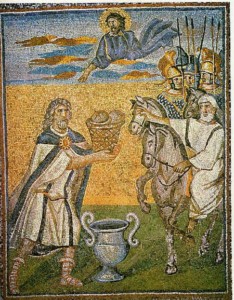Abraham and Melchizedek

In Genesis 14 we read the story of how Abraham warred against the King of Sodom to rescue Lot. After his success, Abraham met a mysterious man named Melchizedek, King of Salem, who is described as a “priest of God Most High” (Gen 14:18). Melchizedek’s name and title respectively translate as “King of Righteousness” and “King of Peace.” Melchizedek then blessed Abraham and, in turn, Abraham gave Melchizedek a tithe.
This event is remarkable. Abraham was the father of the Jews and God had directly made a covenant with him, yet he made an offering to Melchizedek. Thus, St. Paul writes, “now consider how great this man [Melchizedek] was, to whom even the patriarch Abraham gave a tenth of the spoils” (Hebrews 7:4). Despite his evident holiness, Melchizedek is a highly mysterious figure as he does not appear elsewhere in Genesis. We do not know anything about his ancestry, his genealogy, or his life.
We do know, however, that Melchizedek is considered by the Church Fathers as a type or symbol of Christ. Indeed, the Psalmist writes that the Messiah will be “a priest forever according to the order of Melchizedek” (Ps 109:4).
St Paul expands on this theme heavily in his Epistle to the Hebrews where he discusses the difference between the earthly priesthood of the Levites and the eternal priesthood of Melchizedek. The former is comprised of ordinary humans who make sacrifices on behalf of the people as an intercession to God. Although those sacrifices are beneficial, they are ultimately imperfect and incomplete as the priests themselves are unholy.
To properly unite man with God, it was necessary for there to be a new (and holier) priest together with a new sacrifice. This was fulfilled by the coming of our Lord Jesus Christ in the Nativity. Unlike the earthly priesthood, the priesthood of Christ according to the order of Melchizedek is eternal and has the power to transform us, when we let it.
Source: Lychnos December 2020 – January 2021
